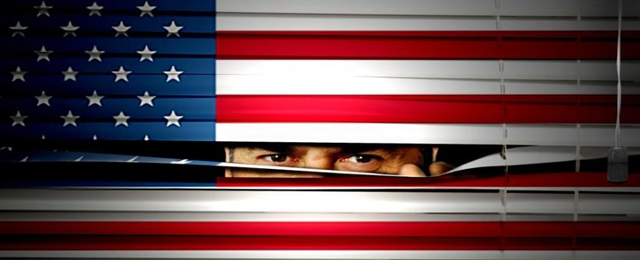Long before President Obama kicked off his 2008 campaign, many Americans took it for granted that George W. Bush’s vast, sprawling national security apparatus needed to be reined in. For Democrats, many independents, and constitutional experts of various persuasions, Vice President Dick Cheney’s notorious doctrine of the “unitary executive” (which holds that the President controls the entire executive branch), was the ultimate statement of the imperial presidency. It was the royal road to easy (or no) warrants for wiretaps, sweeping assertions of the government’s right to classify information secret, and arbitrary presidential power. When Mitt Romney embraced the neoconservatives in the 2012 primaries, supporters of the President often cited the need to avoid a return to the bad old days of the Bush-Cheney-Rumsfeld National Security State as a compelling reason for favoring his reelection. Reelect President Obama, they argued, or Big Brother might be back.
But that’s not how this movie turned out: The 2012 election proved to be a post-modern thriller, in which the main characters everyone thought they knew abruptly turned into their opposites and the plot thickened just when you thought it was over.
In early June 2013, Glen Greenwald, then of the Guardian, with an assist from journalists at The Washington Post, electrified the world with stories drawn from documents and testimony from Edward Snowden, an employee of Booz Allen Hamilton working under contract with the National Security Agency, who had fled the country. They broke the news that the U.S. government had been collecting vast amounts of information on not only foreigners, but also American citizens. And the U.S. had been doing this for years with the cooperation of virtually all the leading firms in telecommunications, software, and high tech electronics, including Google, Apple, Microsoft, Verizon, and Facebook. Sometimes the government even defrays their costs.
For most election analysts, the revelations came like a bolt from the blue, despite a whole series of warning signs. These included Obama’s rapid fire decision to step up the war in Afghanistan right after he took office, the alacrity and severity with which his administration prosecuted national security whistleblowers after promising greater transparency and the administration’s sweeping claims about the government’s right to hold citizens without trial for indefinite periods. Not to mention the Justice Department’s insistence that killing American citizens without any kind of court hearing is lawful, the efforts to prosecute journalists for simply posting links to leaked documents, the overkill that attended official responses to the Occupy movement and protests at the national party conventions, or the White House claims that press freedoms enshrined in the Bill of Rights do not cover bloggers in an era in which everyone, including the New York Times, uses blogs.
Even now, the suggestion that the Obama administration embodies a distinctively new form of extensively privatized National Security State organically linked with the famously contentious Bush-Cheney structures takes some getting used to. In particular, many readers are likely to wonder what a bitter, partisan stalemate such as the U.S. just witnessed over raising the debt ceiling can possibly mean in a situation where Big Brother and Big Money are working hand in hand through it all.
*Read the entire article here.
**This piece was cross-posted from AlterNet. This is the first in a new series from AlterNet’s New Economic Dialogue Project, edited by Lynn Parramore.
***Image copyright: Policymic.com






Be the first to comment on "NSA Scandal: Who Buys the Spies?"